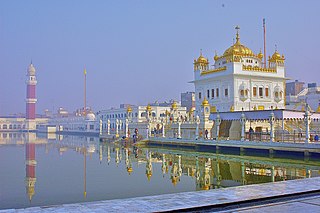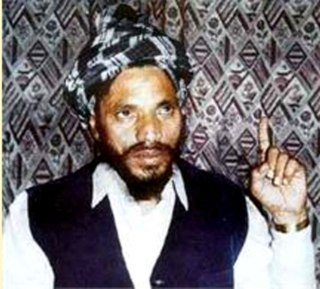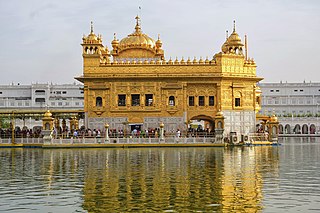
Tarn Taran Sahib is a city in the Majha region of the state of Punjab, in northern India. It is the district headquarters and hosts the municipal council of Tarn Taran district. Gurdwara Sri Tarn Taran Sahib, a prominent Sikh shrine, is located in the central part of the city.

Baldev Singh was an Indian Sikh political leader, he was an Indian independence movement leader and the first Defence Minister of India. Moreover, he represented the Punjabi Sikh community in the processes of negotiations that resulted in the independence of India, as well as the Partition of India in 1947.

Piara Singh Bhaniara also known as Baba Bhaniara, was a Dalit religious leader from Punjab, India. He established a Sikh sect in the 1980s, which was opposed by mainline Khalsa Sikhs as insulting to their faith. In 2001, his followers published their own holy text Bhavsagar Granth, and allegedly insulted the Sikh holy book Guru Granth Sahib. This sparked violence against Bhaniara's followers. The Government of Punjab banned Bhavsagar Granth, and arrested and jailed Bhaniara.

Tara Singh was a Sikh political and religious figure in India in the first half of the 20th century. He was instrumental in organising the Shiromani Gurdwara Prabhandak Committee and guiding the Sikhs during the partition of India, which he strongly opposed.

Sikhism in Pakistan has an extensive heritage and history, although Sikhs form a small community in Pakistan today. Most Sikhs live in the province of Punjab, a part of the larger Punjab region where the religion originated in the Middle Ages, with some also residing in Peshawar in the Khyber-Pakhtunkhwa province. Nankana Sahib, the birthplace of Guru Nanak, the founder of Sikhism, is located in Pakistan's Punjab province. Moreover, the place where Guru Nanak died, the Gurudwara Kartarpur Sahib is also located in the same province.

Majha is a region located in the central parts of the historical Punjab region, currently split between the republics of India and Pakistan. It extends north from the right banks of the river Beas, and reaches as far north as the river Jhelum. People of the Majha region are given the demonym "Mājhī" or "Majhail". Most inhabitants of the region speak the Majhi dialect, which is the basis of the standard register of the Punjabi language. The most populous city in the area is Lahore on the Pakistani side, and Amritsar on the Indian side of the border.
Guru Nanak founded the Sikh religion in the Punjab region of the northern part of the Indian subcontinent in the 15th century and opposed many traditional practices like fasting, Upanayana, idolatry, caste system, ascetism, azan, economic materialism, and gender discrimination.
Mahilpur is a city and a Nagar Panchayat in Hoshiarpur district in the Indian state Punjab. It is situated on Hoshiarpur to Garhshankar stretch of State Highway 24. It is famous for the game of football in the region. Mahilpur is connected by road to nearby districts, states and towns such as Jaijon, Jalandhar, Pathankot, Mohali, Chandigarh. Mahilpur is a development block. Mahilpur block has 140 villages in it. It as also known as the soccer-town of India given the craze of football among the people of Mahilpur town and its surrounding villages. It belongs to the Sirowal area in the Doaba region of Punjab. Mahilpur had its first bank as Punjab National Bank in 1946 which operates two branches in the city. Mahilpur is famous for mangoes in the region.

Indian Sikhs number approximately 21 million people and account for 1.7% of India's population as of 2011, forming the country's fourth-largest religious group. The majority of the nation's Sikhs live in the northern state of Punjab, which is the only Sikh-majority administrative division in the world.
Nirankari is a sect of Sikhism. It was a reform movement founded by Baba Dyal Das in northwest Punjab in 1851. He sought to restore the practices and beliefs of Sikhs back to what he believed were prevalent when Guru Nanak was alive. This movement emerged in the aftermath of the end of Sikh Empire and the Sikh history after Ranjit Singh's death.
Thoha Khalsa is a village in Kahuta Tehsil, Rawalpindi District in Punjab Province of Pakistan.
Governor Ujjal Singh was an Indian politician who was a participant in the First Round Table Conference, opened officially by King George V on 12 November 1930. Ujjal Singh served as the Finance Minister of Punjab, Governor of Punjab, followed by acting Governor of Tamil Nadu. Prior to this he was one of Pre-Partition Punjab's largest landowners, owning thousands of acres in Hadali, Jaranwala, Mian Channu, Lyallpur, Montgomery, Sargodha and other areas.

The Dallewalia misl was founded by Sardar Gulabi singh a Rathore Rajput Sikh as a Jatha but later Succeeded by a Jatt Sikh Sardar Tara Singh Ghaiba of Kang Clan Tara Singh made the Jatha into a powerful Misl in the 18th century India. The founder of this Misl was Sardar Gulab Singh resident of the village of Dallewal near Dera Baba Nanak, in Doaba Bist Jalandhar. He took Pahul and became an active member of the Dal Khalsa in 1726 A.D and launched upon a career of chivalry, fighting against the tyrannical government of the Punjab. One day at the head of 150 comrades, he attacked Jalandhar and having obtained a rich booty all of them returned to their camp in the jungle safely.
Choa Khalsa is a town and Union Council of Kallar Syedan Tehsil, Rawalpindi District, Punjab, Pakistan. Town consist of 800 houses. On 1 July 2004, Choa Khalsa became the Union Council.

Nirmala also known as Nirmala Saṁpardā or Nirmal Paṅth, is a Sikh sect of ascetics. According to the traditional beliefs, the Sanatan Nirmala Sikh tradition was founded by Guru Gobind Singh in late 17th century when he sent five Sikhs to Varanasi to learn Sanskrit and Vedanta texts.

Sikh sects, denominations, traditions, movements, sub-traditions, also known as sampardai in the Punjabi language, are sub-traditions within Sikhism that believe in different approaches to practicing the religion. All sampradas believe in the One Creator God typically rejecting both idol worship and caste systems. Different interpretations have emerged over time, some of which have a living teacher as the leader. The major historic traditions in Sikhism, says Professor Harjot Oberoi, have included Udasi, Nirmala, Nanakpanthi, Khalsa, Sahajdhari, Namdhari Kuka, Nirankari and Sarvaria.

Khem Singh Bedi KCIE was a claimed direct descendant of Guru Nanak, a leader, and the founder of the Amritsar Singh Sabha in 1873. It instituted many charitable causes for Sikhs, was a landowner and politician in the Punjab during the British Raj.
Sardar Gulab Singh was the founder of Dallewalia Misl, one of the sovereign states of the Sikh confederacy that rose during the 18th century in the Punjab region. The Dallewalia and Nishanwalia Misl were stationed as a reserve force at Amritsar to protect the holy city and tackle any emergency. The Amritsar and the Punjab region was subject to raids by the Afghans led by Ahmad Shah Abdali therefore the Sikhs had created misls to defend the Punjab region and push back the invaders.

Brahmin Sikh is a Sikh religious group whose members belong to Brahmin community. They played a key role in the early years of Sikhism. Sometimes they are called Kashmiri Sikhs, for those who are of Kashmiri origin.
In Jammu and Kashmir, the Sikh population consists of native residents and communities originated from Punjab through migration, especially during the period of Maharaja Ranjit Singh and the Khalsa army's ascendancy.













